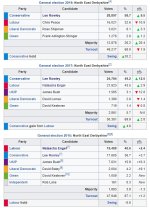Interesting. The bit I can't work out from what you have written is that in a three cornered constituency if party A gets the largest %, but party B and C combined has a bigger %, which candidate goes up to Westminster? A, or (hand in hand, presumably) B and C?
You're not understanding how preferential voting works, then. Neither of your answers are correct. The answer depends on preference flows.
Let's assume:
Party A got 37%
Party B got 32%
Party C got 31%
Let's now assume that:
Party A is right-leaning
Party B is left-leaning
Party C is left-leaning
And that we use a simple preference voting system where voters rank each party 1 to 3. We can see from countries that use preference voting systems, the *vast* majority of preference flows will see voters give their 2nd, 3rd, etc preferences to the parties that are most close to their 1st preference. So in the example above, we'd get:
Party C is eliminated. The vast majority of their votes, when recounted on 2nd preference, would go to Party B. So the Party B candidate would be elected after overtaking Party A.
Now let's assume:
Party A is right-leaning
Party B is left-leaning
Party C is centrist with a slight-right bend
In this circumstance, you would expect slightly more of Party C's votes to go to Party A. That means Party B won't overtake on 2nd preference count, and Party A's candidate gets elected.
Last example, you could have:
Party A is right-leaning
Party B is left-leaning
Party C is centrist with a slight-left bend
In this instance, it would depend on how that centre-left vote splits on second preference. In order for Party B to overtake, they would need to receive a reasonable majority of the preferences from Party C. In this example, the split needed would be roughly 60 / 40 in favour of Party B.

